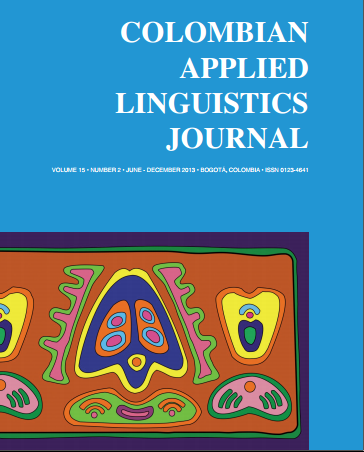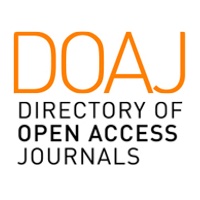DOI:
https://doi.org/10.14483/udistrital.jour.calj.2013.2.a08Published:
2013-07-01Issue:
Vol 15, No 2 (2013) July-DecemberSection:
Research ArticlesAn investigation into how EFL learners emotionally respond to teachers’ oral corrective feedback
Una investigación sobre cómo los aprendices del inglés como idioma extranjero responden a la retroalimentación oral de sus profesores
Keywords:
retroalimentación oral correctiva, daño afectivo (es).Keywords:
oral corrective feedback, affective damage (en).Abstract (en)
This research study draws on research in SLA and language pedagogy and hopes to throw some light on the pedagogical effectiveness of the oral feedback process in L2 classrooms by focusing exclusively on the potential affective damage that teachers´ oral corrective feedback can cause among learners in classroom settings. The paper describes a study in which we investigated how EFL learners actually perceive or rather emotionally respond to the oral feedback process. This paper aims to investigate to what extent the way teachers provide oral corrective feedback is somehow associated with learners´ motivations and attitudes. For this purpose, a short questionnaire was designed and distributed among a sample of 208 EFL secondary school learners. The article first reviews the literature on the controversial role of corrective feedback in L2 classrooms. Next, the findings are reported and discussed. This research paper suggests that EFL learners emotionally respond to teachers´ oral corrective feedback in different ways. Additionally, it found evidence that anxiety can have a negative effect on the way learners benefit from the oral feedback process. Thus, the paper issues warnings about the potential affective damage oral corrective feedback can cause among learners in classroom situations.
Abstract (es)
Este estudio de investigación se basa en la investigación sobre adquisición de segundas lenguas y pedagogía lingüística y pretende arrojar algo de luz sobre la eficacia pedagógica del proceso de retroalimentación oral en las aulas de segunda lengua, centrándose exclusivamente en el potencial daño afectivo que la retroalimentación correctiva oral de los docentes puede provocar entre los alumnos en las aulas. El artículo describe un estudio en el que se investigó cómo los estudiantes de inglés como lengua extranjera perciben en realidad o, más bien, cómo responden emocionalmente al proceso de retroalimentación oral. Este trabajo tiene como objetivo investigar en qué medida el modo en que los docentes proporcionan retroalimentación correctiva oral se asocia de alguna manera con las motivaciones y actitudes de los alumnos. Para ello, un breve cuestionario se diseñó y distribuyó entre una muestra de 208 estudiantes de secundaria de inglés como lengua extranjera. El artículo primero revisa la literatura sobre el controvertido papel de la retroalimentación correctiva en las aulas de segunda lengua. Seguidamente se presentan y discuten los resultados. Esta investigación sugiere que los estudiantes de inglés como lengua extranjera responden emocionalmente a la retroalimentación correctiva oral proporcionada por los docentes de diferentes maneras. Además, se encontró evidencia de que la ansiedad puede tener un efecto negativo en la forma en que los estudiantes se beneficien del proceso de retroalimentación oral. Por consiguiente, este trabajo lanza una advertencia sobre el daño afectivo potencial que la retroalimentación correctiva oral puede causar entre los estudiantes en situaciones de aula.
References
Arnold, J., & Brown, H. D. (1999). A map of the terrain.
In J. Arnold (Ed.), Affect in Language Learning (pp.
-24). Cambridge: Cambridge University Press.
Ayedh, A., & Khaled, E. (2011). EFL teachers’ feedback to
oral errors in EFL classroom: Teachers´ perspectives.
Arab World English Journal,2, (1), 214-232.
Basturkmen, H., Loewen, S., & Ellis, R. (2004). Teachers’
stated belief about incidental focus on form and
their classroom practices.Applied Linguistics,25,
-272.
Bitchener, J. (2008). Evidence in support of written
corrective feedback. Journal of Second Language
Writing, 17, 102–118.
Bitchener, J., & Knoch, U. (2009). The relative effectiveness of different types of direct written corrective
feedback. System,(37), 322-329.
Bitchener, J., & Knoch, U. (2010). The contribution of
written corrective feedback to language development: A ten month investigation. Applied Linguistics,
, 193-214.
Bitchener, J., Young, S., & Cameron, D. (2005). The
effect of different types of corrective feedback on
ESL student writing”. Journal of Second Language
Writing, 14,191-205.
Chandler, J. (2003). The efficacy of various kinds of
error feedback for improvement in the accuracy
and fluency of L2 student writing. Journal of Second
Language Writing,12,267-296.
Dörnyei, Z. (1994). Motivation and motivating in the foreign language classroom.The Modern Language
Journal,78, (3), 273-284.
Colomb. Appl. Linguist. J.
ISSN 0123-4641 • June - December 2013. Vol. 15 • Number 2 • Bogotá, Colombia. p. 265 - 278
An investigation into how EFL learners emotionally respond to teachers’ oral corrective feedback
Ellis, R. (2005).Instructed Second Language Acquisition:
A Literature Review. Wellington, New Zealand: New
Zealand Ministry of Education. Available online at
http://www.educationcounts.govt.nz/__data/assets/
pdf_file/0008/6983/instructed-second-language.pdf
Ellis, R. (2006). Researching the effects of form-focused
instruction on L2 acquisition.AILA,19, 18-41.
Ellis, R. (2007). Corrective feedback in theory, research
and practice. In: The 5
th
International Conference on
ELT in China & the 1
st
Congress of Chinese Applied
Linguistics, May 17-20, Beijing Foreign Language
Studies University, Beijing, China. Available online at
http://www.celea.org.cn/2007/keynote/ppt/Ellis.pdf
Ellis, R. (2009a). Corrective feedback and teacher development. L2 Journal, 1, 1, 3-18.
Ellis, R. (2009b). A typology of written corrective feedback types.English Language Teaching Journal,
, 97-107.
Ellis, R. (2010). Cognitive, social and psychological
dimensions of corrective feedback. In R. Batstone
(Ed.),Sociocognitive Perspectives on Language
Use and Language Learning (pp. 151-165). Oxford:
Oxford University Press.
Ellis, R. (2011). A principled approach to incorporating
second language acquisition research into a teacher
education programme.Reflections on English Language Teaching,9 (1), 1–17.
Ellis, R., & Sheen, Y. (2006). Re-examining the role of
recasts in SLA. Studies in Second Language Acquisition,28, 575–600.
Ellis, R., Sheen, Y., Murakami, M., & Takashima, H. (2008).
The effects of focused and unfocused written corrective feedback in an English as a foreign language
context”. System, 36, 353-371.
Erlam, R., Ellis, R., & Batstone, R. (2013). Oral corrective
feedback on L2 writing: Two approaches compared.
System, 41 (2), 257-268.
Evans, N.W., Hartshorn, K.J., McCollum, R.M., & Wolfersberger, M. (2010). Contextualizing corrective
feedback in second language writing pedagogy.
Language Teaching Research, 14, 445-463.
Farrokhi, F., & Sattarpour, S. (2012). The effects of direct
written corrective feedback on improvement of
grammatical accuracy on high-proficient L2 learners”. World Journal of Education, 2 (2),49-57.
Guenette, D. (2007). Is feedback pedagogically correct?
Research design issues in studies of feedback on
writing. Journal of Second Language Writing,16,
-53.
Han, Z. H. (2002). Rethinking of corrective feedback in
communicative language teaching. RELC Journal,
, 1-33.
Havranek, G. (1999). The effectiveness of corrective
feedback: Preliminary results of an empirical study.Acquisition et Interaction en langue étrangère:
Proceedings of the Eighth EUROSLA Conference,
, 189–206.
Havranek, G. (2002). When is corrective feedback most
likely to succeed?.International Journal of Educational Research, 37, 255-270.
Hyland, F. (2003). Focusing on form: Student engagement with teacher feedback.System, 31 (2),
-230.
Hyland, K., & Hyland, F. (2006). Feedback in Second
Language Writing: Contexts and Issues.Cambridge:
Cambridge University Press.
Iwashita, N. (2003). Negative feedback and positive evidence in task-based interaction: Differential effects
on L2 development. Studies in Second Language
Acquisition, 25 (1), 1–36.
Jean, G., & Simard, D. (2011). Grammar learning in
English and French L2: Students´ and teachers´
beliefs and perceptions. Foreign Language Annals,
(4), 465-492.
Krashen, S. (1982).Principles and Practice in Second
Language Acquisition.Oxford: Pergamon Press.
Lasagabaster, D., & Sierra, J.M. (2005). Error correction:
Students’ versus teachers’ perceptions. Language
Awareness, 14 (2–3), 112–127.
Lee, E. J. (2013). Corrective feedback preferences and
learner repair among advanced ESL students. System, 41 (2), 217-230.
Li, Sh. (2010). The effectiveness of corrective feedback
in SLA: A Meta-Analysis.Language Learning, 60,
, 309–365.
Liang, Y. (2008). The effects of error feedback in second
language writing.Second Language Acquisition and
Teaching, 15,65-79.
Loewen, S. (2004). Uptake in incidental focus on form in
meaning-focused ESL lessons.Language Learning,
, 153-188.
Loewen, S., & Erlman, R. (2006). Corrective feedback
in the chatroom: An experimental study. Computer
Assisted Language Learning,19 (1), 1-14.
Loewen, S., & Nabei, T. (2007). Measuring the effects
of oral corrective feedback on L2 knowledge. In A.
Martínez J., (2013) Colomb. Appl. Linguist. J.
ISSN 0123-4641 • Bogotá, Colombia. Pages 265 - 278 276
Mackey (Ed.),Conversational Interaction in Second
Language Acquisition: A Collection of Empirical
Studies (pp. 361-377). Oxford: Oxford University
Press.
Lyster, R. (1998). Negotiation of form, recasts, and explicit correction in relation to error types and learner
repair in immersion classrooms.Language Learning,
, 183-218.
Lyster, R. (2004). Differential effects of prompts and recasts in form-focused instruction. Studies in Second
Language Acquisition,26, 399-432.
Lyster, R., & Ranta, L. (1997). Corrective feedback and
learner uptake: Negotiation of form in communicative classrooms. Studies in Second Language
Acquisition, 20, 37-66.
Lyster, R., & Saito, K. (2010). Oral feedback in SLA classroom research: A meta-analysis. Studies in Second
Language Acquisition, 32 (2), 265-302.
Lyster, R., Lightbown, P. M., & Spada, N. (1999). A response to Truscott’s ‘What’s wrong with oral grammar
correction’. Canadian Modern Language Review, 55
(4), 457-467.
Lyster, R., Saito, K. &, Sato, M. (2013). Oral corrective
feedback in second language classrooms. Language
Teaching,46 (1), 1-40.
Mackey, A., & Goo, J. (2007). Interaction research in
SLA: A meta-analysis and research synthesis. In A.
Mackey (Ed.), Conversational Interaction in Second
Language Acquisition: A Collection of Empirical
Studies (pp. 407-452). Oxford: Oxford University
Press.
Mackey, A., Al-Khalil, M., Atanassova, G., Hama, M.,
Logan-Terry, A., Nakatsukasa, K. (2007). Teachers´
intentions and learners´ perceptions about corrective feedback on the L2 classroom. Innovation in
Language Learning and Teaching, 1 (1), 129-152.
Mackey, A., Oliver, R., & Leeman, J. (2003). Interactional
input and the incorporation of feedback: An exploration of NS-NNS and NNS-NNS adult and child
dyads. Language Learning, 53 (35)–66.
Martínez, J. D. (2008). Linguistic risk-taking and corrective feedback. In J. D. Martínez (Ed.), Oral Communication in the EFL Classroom (pp. 165-193). Sevilla:
Ediciones Alfar.
Montgomery, J., & Baker, W. (2007). Teacher-written
feedback: Student perceptions, teacher self-assessment, and actual teacher performance.Journal
of Second Language Writing, 16, 82-99.
Panova, I., & Lyster, R. (2002). Patterns of corrective
feedback and uptake in an Adult ESL classroom.
TESOL Quarterly, 36, (4), 573-595.
Rassaei, E. (2013). Corrective feedback, learners´
perceptions, and second language development.
System,41 (2), 472-483.
Russell, J., & Spada, N. (2006). The effectiveness of corrective feedback for the acquisition of L2 grammar.
A metaanalysis of the research. In J. M. Norris & L.
Ortega (Eds.) Synthesizing Research on Language
Learning and Teaching (pp. 133-164). Philadelphia:
John Benjamins.
Russell, V. (2009). Corrective feedback, over a decade
of research since Lyster and Ranta (1997): Where
do we stand today? Electronic Journal of Foreign
Language Teaching, 6 (1), 21-31.
Schulz, R. A. (2001). Cultural differences in student and
teacher perceptions concerning the role of grammar
instruction and corrective feedback: USA-Columbia.
Modern Language Journal, 85, 244-258.
Schwartz, B. (1993). On explicit and negative data
effecting and affecting competence and linguistic
behavior.Studies in Second Language Acquisition,
, 147–163.
Shaofeng, L. (2010). The effectiveness of corrective feedback in SLA: A meta-analysis.Language Learning,
, 2, 309-365.
Sheen, Y. (2004). Corrective feedback and learner
uptake in communicative classrooms across instructional settings. Language Teaching Research,
(3), 263–300.
Sheen, Y. (2006). Exploring the relationship between
characteristics of recasts and learner uptake.Language Teaching Research, 10, 361-392.
Sheen, Y. (2007). The effect of focused written corrective
feedback and language aptitude on ESL learners’
acquisition of articles. TESOL Quarterly,41, 255-283.
Sheen, Y. (2010a). The role of oral and written corrective feedback in SLA. Studies in Second Language
Acquisition, 32, 169-179.
Sheen, Y. (2010b). Differential effects of oral and written
corrective feedback in the ESL classroom”. Studies
in Second Language Acquisition,32, 203-234.
Sheen, Y., Wright, D., & Moldawa, A. (2009). Differential
effects of focused and unfocused written correction
on the accurate use of grammatical forms by adult
ESL learners. System, 37, 556-569.
Storch, N. (2010). Critical feedback on written corrective
feedback research. International Journal of English
Studies,10 (2), 29-46.
Colomb. Appl. Linguist. J.
ISSN 0123-4641 • June - December 2013. Vol. 15 • Number 2 • Bogotá, Colombia. p. 265 - 278
An investigation into how EFL learners emotionally respond to teachers’ oral corrective feedback
Truscott, J. (1999). What´s wrong with oral grammar
correction.The Canadian Modern Language Review,
(4), 437-455.
Truscott, J. (2004). Evidence and conjecture on the effects of correction: A response to Chandler. Journal
of Second Language Writing,13, 337–343.
Truscott, J. (2007). The effect of error correction on learners’ ability to write accurately. Journal of Second
Language Writing, 16, 255-272.
Yoshida, R. (2008). Teachers’ choice and learners’
preference of corrective feedback types. Language
awareness,17, 1, 78-93.
Zacharias, T. (2007). Teacher and student attitudes
towards feedback.RELC Journal, 38, 38-52
How to Cite
APA
ACM
ACS
ABNT
Chicago
Harvard
IEEE
MLA
Turabian
Vancouver
Download Citation
Metrics
License
This work is licensed under a Creative Commons Attribution-NonCommercial-NoDerivatives 4.0 International License.
Attribution — You must give appropriate credit, provide a link to the license, and indicate if changes were made. You may do so in any reasonable manner, but not in any way that suggests the licensor endorses you or your use.
NonCommercial — You may not use the material for commercial purposes.
NoDerivatives — If you remix, transform, or build upon the material, you may not distribute the modified material.
The journal allow the author(s) to hold the copyright without restrictions. Also, The Colombian Apllied Linguistics Journal will allow the author(s) to retain publishing rights without restrictions.













.JPG)










